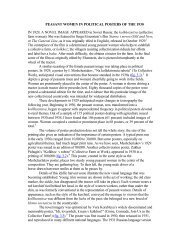Berkeley's Betrayal - Public Sociology @ Berkeley - University of ...
Berkeley's Betrayal - Public Sociology @ Berkeley - University of ...
Berkeley's Betrayal - Public Sociology @ Berkeley - University of ...
You also want an ePaper? Increase the reach of your titles
YUMPU automatically turns print PDFs into web optimized ePapers that Google loves.
MIND THE GAPIf you ask U.C. <strong>Berkeley</strong> to explain its salary scale, you will hear much about decreasedpublic funding. During the recession <strong>of</strong> the early 1990s, the funding for both the <strong>University</strong> <strong>of</strong>California and the California State <strong>University</strong> systems dropped by over half <strong>of</strong> a billion dollars. 4Today, the <strong>University</strong> <strong>of</strong> California is slated for $372 million in cuts, pending the Legislature’sapproval. California’s public higher education once again finds itself on the brink <strong>of</strong> insolvency,in the wake <strong>of</strong> the 2000-2001 California energy crisis, the legacy <strong>of</strong> the “three strikes” initiativewhich created the need for more expensive prisons, and the largest deficit in state history.While the state’s budget crisis has indeed forced the U.C. administration to tighten thebelt, the burden <strong>of</strong> such belt-tightening has been unevenly distributed. A look at U.C.<strong>Berkeley</strong>’s financial history over the past two decades indicates that budgetary constraints donot explain its labor practices. First <strong>of</strong> all, the university currently depends on the state for lessthan a quarter <strong>of</strong> its funding. 5 In other words, reduced state funding does not immediately andnecessarily translate into reduced salaries. Moreover, in the case <strong>of</strong> clerical workers, U.C.’sfigures show that only a little over a third <strong>of</strong> clerical units rely on state funds for their salaries.Thus, two-thirds <strong>of</strong> clerical worker salaries are unaffected by reductions in state funding.Economist Peter Donahue found that despite repeated public statements to the contrary, theuniversity—which has accumulated a $2.1 billion fund surplus—is perfectly capable <strong>of</strong> raisingthe salaries <strong>of</strong> its underpaid staff. 6Second, the funds available do not determine the choices the university makes in allocatingthem. In the early 1990s, U.C. <strong>Berkeley</strong> cited budget cuts to justify its failure to provide pay raisescommensurate with the rising costs <strong>of</strong> living. However, just a few years later, when the State<strong>of</strong> California saw budget surpluses, U.C. <strong>Berkeley</strong> kept wages stagnant for all but its top administrators.In 2001, when surpluses turned into deficits once again, U.C. administrators announcedthat budget cuts meant that employees would not receive an expected 4% increase. Yet that sameyear, they approved pay raises <strong>of</strong> up to 25% for 49 <strong>of</strong> the <strong>University</strong>’s top administrators, includingformer President Richard Atkins and the chancellors at all U.C. campuses. This historydemonstrates that wage stagnation at the bottom is due to a lack <strong>of</strong> will, not a lack <strong>of</strong> resources.Over the last decade (1990-2000), clerical salaries have grown only 20%; meanwhile, in theOffice <strong>of</strong> the President, salaries rose 50% between the years 1996 and 2002. 7 Today, while manyU.C. <strong>Berkeley</strong> workers struggle to make ends meet, at least 180 university administrators enjoyincomes <strong>of</strong> over $100,000. Our Chancellor takes home $310, 896.The trend <strong>of</strong> wage inequality has continued even through the current (2004) fiscal crisis.While the wages <strong>of</strong> rank and file workers remain stagnant and students are forced to pay dramaticallyhigher tuition (or are simply turned away), the U.C. Board <strong>of</strong> Regents recently approved a$75,000 a year salary increase for the Chancellor <strong>of</strong> U.C. <strong>Berkeley</strong> and a $70,000 a year salaryincrease for the chancellor <strong>of</strong> U.C. San Diego. Within the previous year, U.C. had already granteda $100,000 pay raise to the U.C. Provost and a $78,000 raise to the U.C. Senior VicePresident. 8 This inspired the San Francisco Chronicle editorial board to exhort the university tostop “mimicking practices that have contributed to the stratospheric salaries <strong>of</strong> corporate executives,”and to act “as a center for higher learning rather than as a pr<strong>of</strong>it- making corporation.” 914



